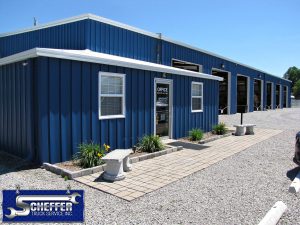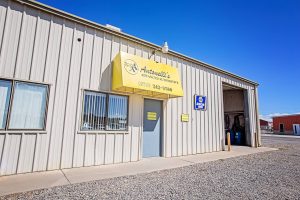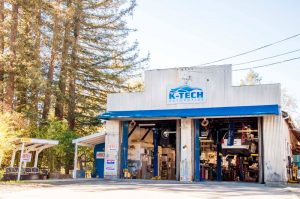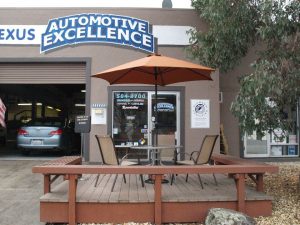You’re running a business – with production targets you need to hit in order to reach your goals – not a non-profit enterprise.
So why should you incorporate Green initiatives? It’s certainly not a priority. And it’s not going to generate a larger car count. Or can it indirectly?
Let’s get this out of the way first. Running a repair shop that has Green policies in place doesn’t make you or your business radical, unorthodox or unconventional. It just represents that you are forward thinking and yes – practical.
Many Green policies that are put into place by shops grow out of an awareness that putting them in place just makes sense. Both from an environmental standpoint – but also from a business perspective.
Todd Scheffer of Scheffer Truck Service of Cape Girardeau, MO installed a rooftop solar system that generates up to ½ of his overall electricity. Todd also has a waste oil heater for his shop – he’s basically using customers used oil to heat his shop up in the Winter.
“I’m not sure we are necessarily a Green shop. We just do what makes sense and is cost effective,” – Todd Scheffer of Scheffer Truck Service

Scheffer Truck Service of Cape Girardeau, MO
“Before owning my own business, I worked at a shop that heated a barely insulated shop with a boiler powered by natural gas. For just two Winter months, they could have paid for a waste oil heater and heated the shop with customers used oil that they were paying to get rid of,” adds Todd. The key with the policies and procedures he puts in place is that they need to make sense. They need to be practical solutions.
There are all levels of a Green shop. It could be starting to recycle paper and plastics to something more advanced like what Todd Scheffer has done.
Dan Antonelli of Antonelli’s Advanced Automotive of Grand Junction, CO started with recycling plastics, cardboard, cans and bottles. Dan now heats his building with waste oil.

Antonelli’s Advanced Automotive of Grand Junction, CO
“My goal was to reduce waste going to the landfill and reduce our consumption of natural gas. Plus I save money using the waste oil,” – Dan Antonelli of Antonelli’s Advanced Automotive
Depending on the community your business is located, there may also be a Marketing upside to instituting Green policies. Kate Jonasse is the owner of K-Tech Automotive in Sebastopol, CA which is in Sonoma County. She has a clientele that is interested in frequenting a local business that has an eye towards sustainability.
While owning a Green business fits Kate’s values and the values of her community it needs to be realistic.
“I’m ultimately practical first and foremost. We do what makes sense,” – Kate Jonasse of K-Tech Automotive

K-Tech Automotive in Sebastopol, CA
“For example, the bulk cleaner I purchase is around $900 per 55 gallon drum, which is a high initial cost, but it lasts a long time and is actually cheaper than brake clean,” says Kate.
K-Tech is also Green Certified by the Sonoma County Green Business Program – something that keeps Kate’s shop up to date with requirements plus she’s able to tout this to her customer base. She considers this an enhancement to her shop and makes people feel good about coming back again and again to K-Tech.
If you do choose to start instituting Green policies, don’t forget to tell people. With each step along the way, update your website with what you’re doing and why. Social media and your shop blog are perfect platforms to promote your sustainability journey. If you start with recycling, post about doing that. If you then begin to include other Green policies, update your website. Doing this engages customers in your business. Having a new element of your business to promote is always good – it communicates that you have a vibrant and modern repair shop.
While not directly a revenue generator, being able to promote this to customers is a good thing.

Eureka Brake & Automotive of Eureka, CA
“I think any time you can add one more thing to talk about and edify your business to new and existing customers, the better,” – Lacee Cunningham of Eureka Brake & Automotive
For Terri Erickson of Automotive Excellence in Rohnert Park, CA – also in Sonoma County, CA, she has been passionate about environmental issues for the past few decades. Her first step in owning a Green shop was to contact her local garbage company for dumpsters. She also feels this is not only the right thing to do, but it’s also important to:
“leave a better world for our grandchildren.” – Terri Erickson of Automotive Excellence

Automotive Excellence in Rohnert Park, CA
Bottomline – as a business owner, each new policy you establish needs to fit the vision and profile of your shop. You may want to include some sustainability strategies because you think it’s the right thing to do. Or you may want to include because you just don’t like wasting anything – 100 years ago, no one wasted anything because resources were scarce – take a que from your great grandparents and consider what you are throwing away. And saving some money is always a goal. You may be doing all three by just starting a recycling program. Who knows – you may end up buying a complete solar system just like Todd Scheffer.
Contact your city, county, state for guidelines on becoming a Green business.
Published in Shop Owner Magazine
Print version: Shop Owner Magazine






 For DRIVE clients, click
For DRIVE clients, click 
